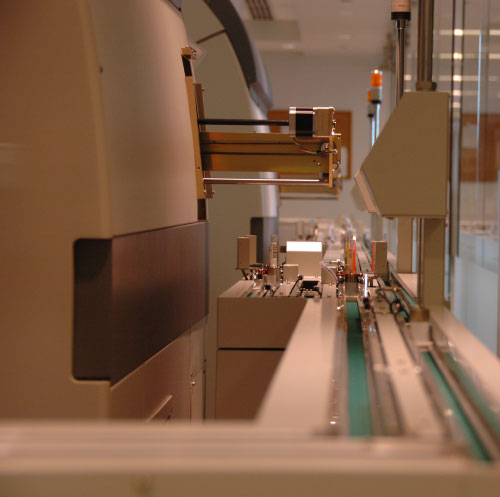
The residency training program in medical biochemistry at McGill University is coordinated between the Divisions of Medical Biochemistry at the five teaching hospitals (i.e., RVH, MGH, JGH, MCH and St. Mary's) and with the Programme Réseau en Biochimie Médicale in the Province of Quebec.
The programme réseau en biochimie médicale was established in 1988 to coordinate the admission of residents and the requirements of the teaching program. This organization is based at the Université Laval and has been approved by the Royal College and by the Collège des médecins du Québec. Applicants usually enter the program at the PGY-4 level via CaRMS.
A two year training program is offered after three years of Internal Medicine or Pediatrics. The PGY-4 and PGY-5 years will be laboratory-oriented and during this time the resident acquires the basic knowledge of medical biochemistry and the functioning of the laboratory.
The distribution of activities in the the program is flexible and can be modified through discussion with the program director, but will have to meet the overall guidelines of the accrediting bodies. Some period of the training can be carried out in different medical schools of the "réseau" and this will be encouraged.
Continuing exposure to clinical problems and clinical practice will be encouraged during the two years of laboratory training, providing this does not exceed one half day per week. Attendance at appropriate specialty rounds will be encouraged. Every effort will be made to allow the trainee to rotate through the laboratories of each of the designated hospitals. This will include exposure to the particular problems of pediatrics and neonatology. A period of practical experience of a major endocrine laboratory will also be obtained (viz, thyroid, steroid or polypeptide hormone laboratories). The trainee will be guided into selection of suitable graduate courses given by the appropriate graduate departments (experimental medicine, biochemistry, physiology or pharmacology).
Prospective candidates for this program are encouraged to meet with any of the laboratory directors mentioned above or with the program director who will be pleased to explain the objectives of the specialty to them. The specialty encourages applicants who are interested in a career combining basic science with clinical medicine. Because of the nature of the specialty, medical biochemists generally follow a career in academic tertiary health care centres and interesting academic careers both in teaching and research will be available to them.
Applicants to the program will be considered by the McGill Training Program Committee and proposed to the Admissions Committee of the Programme réseau. It is recommended that application for the program be made no later than July of the year preceding the commencement of the program.
The aim of this program is to produce a specialist sufficiently well versed in all aspects of medical biochemistry to enable him/her to direct a laboratory of this type in a major hospital. The certified specialist should be able to act as a consultant to his/her medical colleagues on the selection and interpretation of laboratory tests. The specialist should be competent to select, design and pursue his/her own research program and to take part in the university teaching duties in this specialty as required. The specialist will be encouraged to develop his/her own special area of interest within the specialty which could be enzymology, endocrinology, molecular biology, quality control, automation, data processing, laboratory screening procedures for adults or infants, toxicology, analytical techniques using advanced instrumentation (such as gas or liquid chromatography or mass spectrometry) or radio-immune and radio-ligand assays.
For application information please consult the web site at https://www.mcgill.ca/pgme/